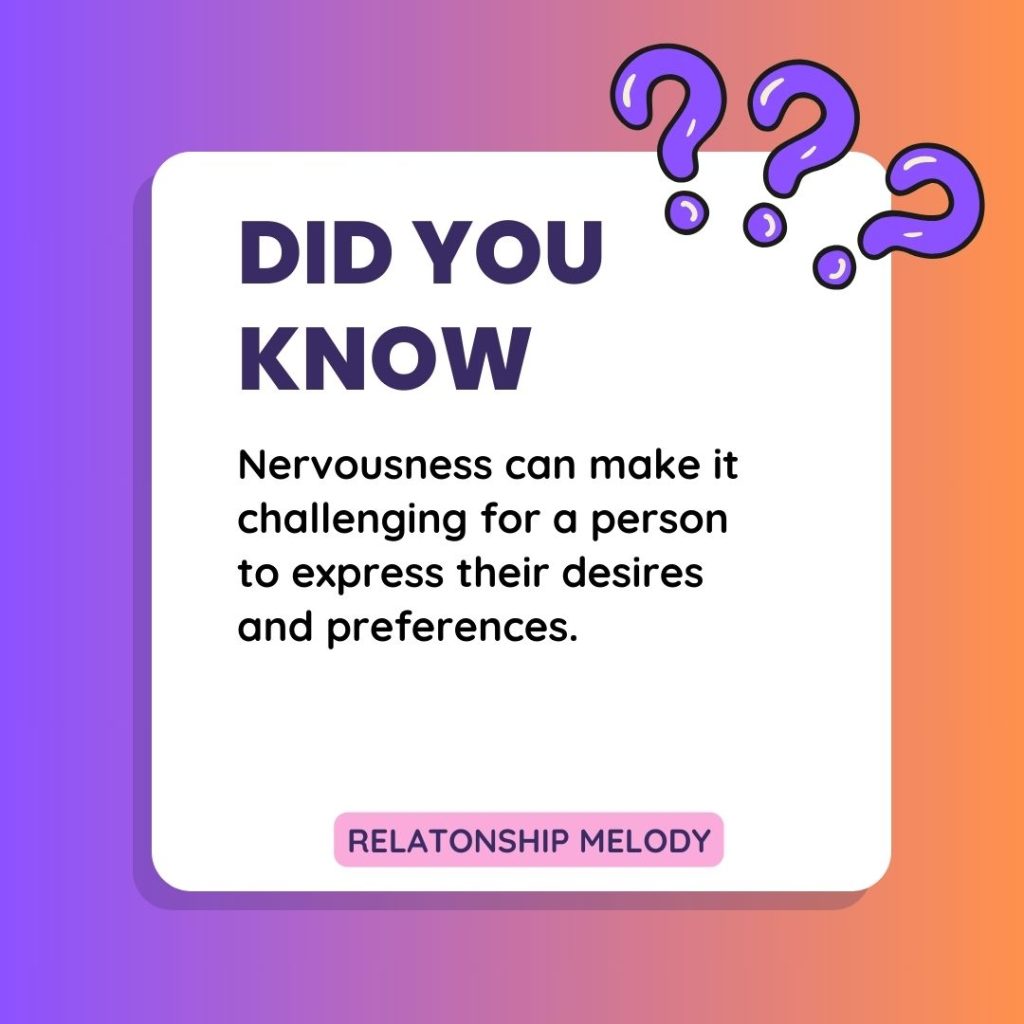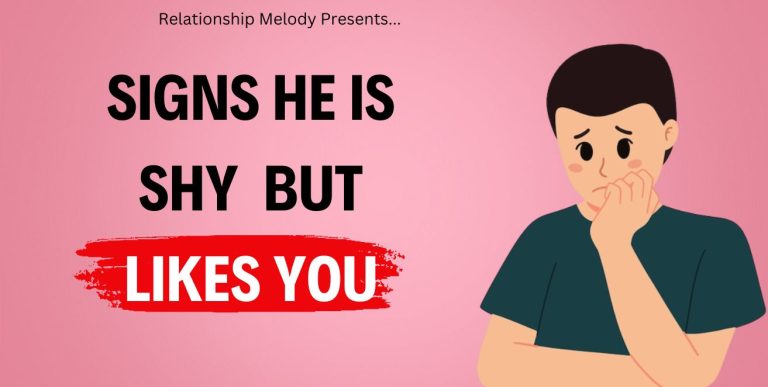25 Signs He Is Nervous In Bed
When it comes to sexual intimacy, everyone experiences a range of emotions. One common feeling that can arise is nervousness, and it’s not limited to just one gender. Men, in particular, may display subtle signs of anxiety in the bedroom.
In this blog post, we’ll delve into 25 signs that can indicate a man is feeling nervous during intimate moments. By understanding these signs, you can create a more compassionate and supportive atmosphere for both you and your partner.
25 Signs He Is Nervous In Bed
Here are 25 signs to know.
#1 Awkward Body Language:
Nervousness often manifests as rigid or fidgety body language. The person may avoid eye contact, appear tense, or exhibit restless movements, indicating their unease at the moment.
#2 Difficulty Initiating:
Nervousness can make it challenging for a person to initiate physical contact. They may fear rejection or judgment, leading to hesitancy and uncertainty about making the first move.
#3 Overthinking:
Anxious individuals tend to overanalyze every move they make during intimate moments. This can result in a cautious and hesitant approach, as they constantly worry about doing something wrong or not meeting their partner’s expectations.
#4 Lack of Confidence:
Nervousness often stems from a lack of self-assurance. The person may doubt their abilities, appearance, or performance, seeking constant reassurance from their partner.
#5 Excessive Talking:
To divert attention from their nervous state, individuals may engage in excessive talking during intimate moments. This chapter serves as a distraction and can be a way to mask their true feelings of anxiety.
#6 Premature Ejaculation:
Performance anxiety commonly leads to premature ejaculation, where the person ejaculates sooner than desired. This can be frustrating and embarrassing for them, further intensifying their nervousness.
#7 Difficulty Maintaining Erection:
Nervousness can interfere with a person’s ability to maintain an erection. Performance anxiety and self-doubt can create a cycle of stress, making it challenging to achieve or sustain an erection, impacting sexual satisfaction.
#8 Excessive Sweating:
Even in a comfortable environment, nervousness can cause excessive sweating. It’s a physiological response to anxiety, as the body tries to regulate its temperature in response to heightened stress levels.
#9 Rapid Breathing:
Shallow or rapid breathing is a common physical manifestation of nervousness. The person may experience an increased heart rate and shortness of breath, reflecting their heightened anxiety levels.
#10 Lack of Spontaneity:
Nervous individuals may struggle to go with the flow during intimate moments. They might prefer a rigid routine or structure to feel more in control, as spontaneity can be overwhelming for them.
#11 Inadequate Foreplay:
Due to nervousness, a person may engage in hurried or insufficient foreplay. They might rush through this important aspect of intimacy, hindering arousal and the overall experience for both partners.
#12 Avoidance of Eye Contact:
A common subconscious response to nervousness is to avoid eye contact. By averting their gaze, the person protects themselves from feeling vulnerable and exposed, creating a sense of emotional distance.
#13 Excessive Self-Criticism:
Nervousness often leads to excessive self-criticism. The person may constantly focus on their perceived flaws or mistakes during intimate moments, undermining their confidence and enjoyment.
#14 Difficulty Communicating Desires:
Nervousness can make it challenging for a person to express their desires and preferences. They may fear judgment or rejection, leading to a reluctance to communicate openly about their needs.

#15 Reluctance to Experiment:
A nervous partner may shy away from exploring new positions, activities, or fantasies in the bedroom. They may prefer sticking to familiar routines and avoiding anything that feels unfamiliar or outside their comfort zone.
#16 Lack of Initiating Intimacy Outside the Bedroom:
Nervousness can extend beyond the bedroom, affecting a person’s ability to initiate or show affection in non-sexual settings. They may struggle to express intimacy and connect emotionally outside the sexual realm.
#17 Excessive Use of Alcohol or Drugs:
Some individuals turn to alcohol or drugs to alleviate nervousness before engaging in sexual activities. They may rely on these substances to achieve false confidence and relaxation, although it’s not a healthy or sustainable coping mechanism.
#18 Over-Apologetic Behavior:
A nervous person may apologize excessively for perceived mistakes or shortcomings during intimate moments. They may constantly seek validation or forgiveness, fearing they are not meeting their partner’s expectations.
#19 Performance Comparisons:
Nervousness often leads to comparing oneself to previous partners or unrealistic expectations. The person may constantly measure their performance against these benchmarks, intensifying their anxiety and self-doubt.
#20 Inability to Orgasm:
Nervousness can interfere with a person’s ability to reach orgasm. The heightened anxiety and difficulty relaxing can make it challenging for them to fully let go and enjoy the experience.
#21 Lack of Emotional Connection:
Nervousness may hinder a person’s ability to establish an emotional connection during intimate moments. They may be more focused on the physical aspects, struggling to be fully present and emotionally engaged.
#22 Excessive Distraction:
An anxious mind tends to wander, leading to reduced focus and diminished pleasure for both partners. The person may find it difficult to stay at the moment and fully engage in the experience due to their preoccupation with anxious thoughts.
#23 Inconsistency in Libido:
Nervousness can cause fluctuations in a person’s libido. They may experience unpredictable shifts in sexual desire, influenced by their anxiety levels and emotional state.
#24 Hesitant Touch:
A nervous person may hesitate when touching their partner. They may fear rejection or uncertainty about what pleases their partner, resulting in a cautious approach to physical intimacy.
#25 Post-Sex Anxiousness:
Nervousness can persist even after the act itself. A person may experience anxiety about their performance, satisfaction, or the future of the relationship, which can affect their overall well-being and sexual confidence.
Read more: Signs He Is Nervous Around You.
Conclusion:
Recognizing the signs of nervousness in your partner is the first step toward creating a safe and supportive environment for intimate moments. By understanding and addressing these signs with patience, communication, and reassurance, you can help your partner overcome their anxiety, fostering a more fulfilling and enjoyable sexual connection.
Remember, open and honest communication is crucial in building trust and intimacy, allowing both partners to explore and grow together in their sexual journey.
Liked Our Article?
Our Patreon link: https://www.patreon.com/RelationshipMelody

Welcome to Relationship Melody! Our website is dedicated to all things on relationships, dating, and love! We are passionate about helping you navigate the ups and downs of love, and our goal is to provide you with valuable insights and information that will make your journey toward a fulfilling relationship smoother and more enjoyable.







